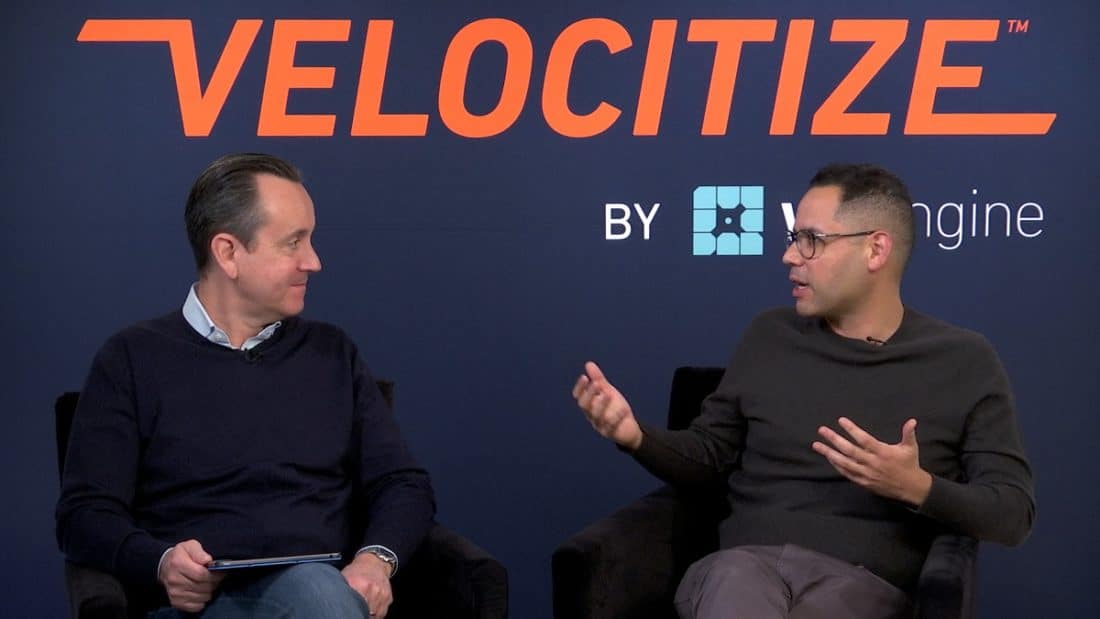Organizations like Amazon can have devices in your home that can understand whether you’re at risk of depression or Alzheimer’s or Parkinson’s. That totally reframes the value equation of how you interact with Amazon, who Amazon is and the role they play in your daily life. I think it lowers the barrier for people to be comfortable with sharing or over-sharing data. So it raises all sorts of questions.
Camilo La Cruz is the Chief Strategy Officer at sparks & honey, a digital cultural consultancy combining social and data sciences to solve world-changing challenges. Prior to sparks & honey, he was EVP and Director of Innovation & Experience Design at RAPP as well as an adjunct faculty professor at New York University.
In this episode of Velocitize Talks, La Cruz discusses how culture is changing precision data, how precision data is changing culture, and how deep personalization will shift consumer behavior going forward.
Trendsetters (0:45)
Four or five years ago people were scratching their heads about algorithmic bias which led to important discussions around including philosophy and ethics as part of the curricula for engineers involved in machine learning and AI.
From the beginning, sparks & honey set out to help private and public sector organizations not only navigate change but formulate strategies to thrive during moments of change. To do this the agency developed some key tools.
One of these tools, “The Elements of Culture,” collects data from a number of different sources and then processes that data against 158 trends, which are constantly evolving and growing with the times. This information takes the data coming from memes and social media as well as academic research, patents and VC funding and helps clients ID change quickly, which can then be used to inform corporate strategy, communications plans, product development, and many other initiatives.
Introducing the Precision Consumer (2:33)
It shows there’s a huge cultural appetite for products and services that come from our most intimate data to be personalized to an almost mysterious and magical degree.
For the World Economic Forum, sparks & honey launched a report, “The Precision Consumer 2030,” that mapped investments of large organizations across various technologies—smart home, smart devices, voice, smart city, emotion recognition technology, and genomics—which pointed to a convergence of information technologies on one hand and digital biology on the other. This report helped to create a very powerful picture of the future of commerce.
Up close & personalized (8:28)
The C-suite needs to be acutely aware of the fact that with new data sets entering the personalization, product development and service design space…are going to push a lot of industries into the health and wellness area. If you’re not walking in with your eyes wide open, you are going to miss opportunities.
Today, there’s an enormous amount of funding, about $1.1 trillion over the past three years, being invested in companies that are creating precision technology, according to software company Quid. The excitement in this area is due in part to research that suggests consumers are willing to spend an up to 20 percent premium for such things as personalized or precision medicine.
Life, extended (9:58)
As a society and as a culture we’re obsessed with not just wellness but staying well, which gets into the area of extending our lifespan. I think it’s a big motivator for people to be interested in this space.
Today, the scientific term “precision” is mainly associated with medicine or health. According to sparks & honey’s Precision 2030 report, the precision medicine industry is a thriving market and will reach $96.6 billion by 2024, with a compound annual growth rate (CAGR) of 10.7 percent. But precision medicine is also permeating nutrition, wellness, beauty, human performance, and even entertainment, agriculture and our very planet.
As our human needs evolve in these deeply personalized spaces, the science and technology of precision will follow. By 2030, longevity gains from precision nutrition may push healthy life expectancy into the 100’s for those with access to the technology. As a consequence, corporate strategy will likely need to adapt to longer lives across talent management, R&D, CSR, and marketing.
Deeper recognition (11:23)
It’s fascinating that we can take all of that data right and bring it into processing environments where we can make sense of the world in ways that are really magical.
With the increased investment and focus going into areas like emotion recognition technology, things like correctly identifying emotions could become a really important part of reading our biology. That’s likely why the emotion recognition industry alone is set to grow to $24.74 billion by 2024 according to Marketwatch.
Other related areas getting a lot of interest include the biometrics space, sound recognition and voice, particularly in the area of decoding our voice for the purposes of understanding who we are. For instance, researchers like Rita Singh at Carnegie Mellon University, can take a snippet of your voice, process that through an algorithm to reveal everything from your height, your age and even whether you’re tired.
Correction: Rita Singh is an Associate Research Professor at Carnegie Mellon University, not Cornell University.
For more information on sparks & honey, check out their website. To stay up to date with La Cruz, follow him on LinkedIn.
